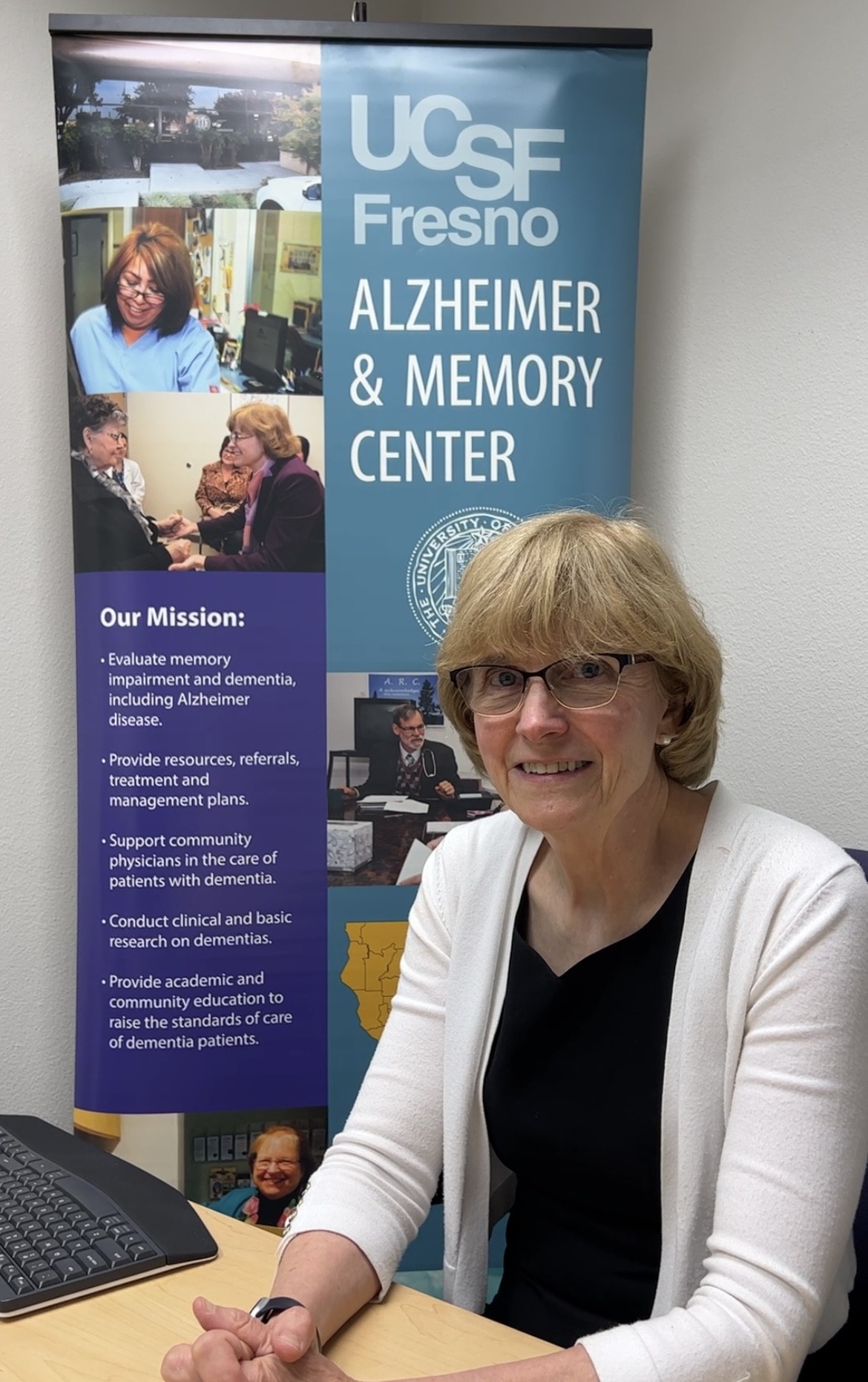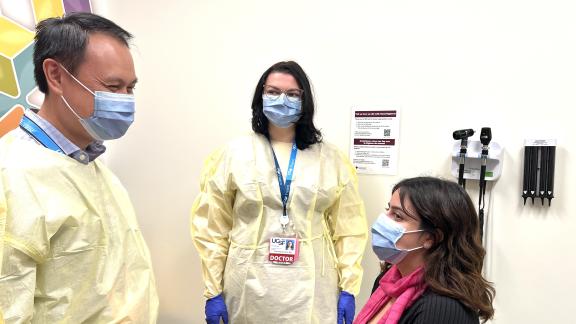
The UCSF Fresno Alzheimer & Memory Center celebrated 35 years of providing dementia care and support services to patients and families in the San Joaquin Valley in 2024. As one of 10 centers of excellence in California, it conducts evaluations, makes diagnoses, treatment plans, and referrals to community resources for people with dementia and their families.
As the only center in the central San Joaquin Valley, the center provides services in Fresno, Kings, Madera, Merced, Mariposa, Tulare, Stanislaus, San Luis Obispo and Tuolumne counties – an underserved part of the state.
“The presence of a California Alzheimer’s disease center in the San Joaquin Valley is significant because it raises the profile of Alzheimer’s disease and related dementias,” said Loren Alving, MD, a UCSF professor of Neurology and director of the UCSF Fresno Alzheimer & Memory Center (AMC).
Dr. Alving credits John Blossom, MD; David Ira Margolin, MD, PhD; and Glen Caspers Doyle, NP, PsyD, for applying for and receiving funding from the state in 1989 to create the UCSF Fresno Alzheimer & Memory Center. Dr. Blossom, a UCSF professor emeritus, was at that time chief of the Department of Family and Community Medicine at UCSF Fresno. Dr. Margolin, a neurologist, was a UCSF faculty member and chief of neurology at the Veterans Administration hospital in Fresno; and Doyle (now deceased) was director of Fresno State’s gerontology program. Linda Hewett, PsyD., a retired UCSF associate professor, neuropsychologist and former co-director of the AMC, also was critical in the early years in ensuring the continued existence of an AMC in the Valley.
The State of California partially supports the AMC with grant funding and private donations. AMC welcomes tax-deductible donations, which are used to support patient care, education and research.
“The state of California investing in these centers was a very good investment,” Dr. Alving said. “Certainly, our center, though it’s physically isolated from other academic centers, has benefitted from the colleagues and our interactions at the state centers to bring a level of expertise in dementia to the San Joaquin Valley.”
Mario Peña, regional director of the California Alzheimer’s Association, said the organization is working “to ensure the state's California Alzheimer's Disease Centers (CADCs) are adequately funded and have partnered with all 10 sites on joint outreach to lawmakers to highlight their important role in fighting the disease.
“We are out in the community, connecting with public policy efforts, and it's essential to have these resources in our local communities,” Peña said. “The aim is to ensure residents have access to treatment and a diagnosis, and we're happy to have that in Fresno. We hope to work with the state and expand these efforts and opportunities in other needy areas."
UCSF Fresno’s AMC collaborates with programs locally and across the state related to Alzheimer’s and dementia care, including the state’s Dementia Toolkit Program, which gives primary care physicians information about clinical interviews and an interpretation guide for making a confident diagnosis of Alzheimer’s disease and making a referral when necessary.
“We train our UCSF Fresno residents in Family and Community Medicine; we train residents in Psychiatry; and we train medical students in the care of dementia patients in the hopes that when they go out and practice, they will have that fundamental knowledge about how to take care of these patients,” Dr. Alving said.
The need for services for Alzheimer’s patients and their families is increasing. The most recent data shows 64,400 cases of Alzheimer’s disease in people 65 and older in the Valley and 719,700 Californians aged 65 and older with Alzheimer’s. A recent report from the Alzheimer’s Association said cases in California will increase by more than 20% between 2020 and 2025.
“There is no way neurologists, and particularly those who specialize in Alzheimer’s disease can see all the patients who come down with Alzheimer’s disease in the coming years,” Dr. Alving said, “and having a well-educated workforce is extremely important, and is one of the things that we focus on.”
The UCSF Fresno AMC has a multidisciplinary team that consults with patients and their families. The team includes Dr. Alving, Jason Gravano, PhD, a neuropsychologist, and AMC Co-director Alex Sherriffs, MD, a UCSF professor and a Family and Community Medicine physician specializing in geriatrics.
“The most important thing the center does is the family conference,” Dr. Sherriff’s said. “It is an opportunity to share the multidisciplinary team’s conclusions with the patient and the family to help them map out ongoing management plans and follow-up. And the work the center does in connecting families to community resources is critical.”
The UCSF Fresno AMC is working with the state to create a training program for caregivers in Northern California. The goal is to have educational materials for people to access in their own time to try to get connected to the right places while avoiding real barriers, so they do not have to attend a training program at a specific time, Dr. Gravano said.
Another focus is the community. The AMC trains local providers and institutions about vulnerable and underserved persons with dementia and does outreach to underserved populations, including the LGBTQ+ community and the Latinx community; and the center collaborates with partners in the community to hold an Alzheimer’s Caregiver Conference twice a year, once in English and once in Spanish.
“We work with the Valley Caregiver Resource Center, a local organization providing information and resources to caregivers. It is usually one of the most important referrals we make when patients come to our center,” Dr. Alving said. The AMC also works with the Alzheimer’s Association, which has a branch in Fresno. It is with those two partners that the AMC puts on the Caregivers Conference.
“We feel that a well-educated caregiver or caregiving family is the most important thing for a patient with dementia,” Dr. Alving said.





